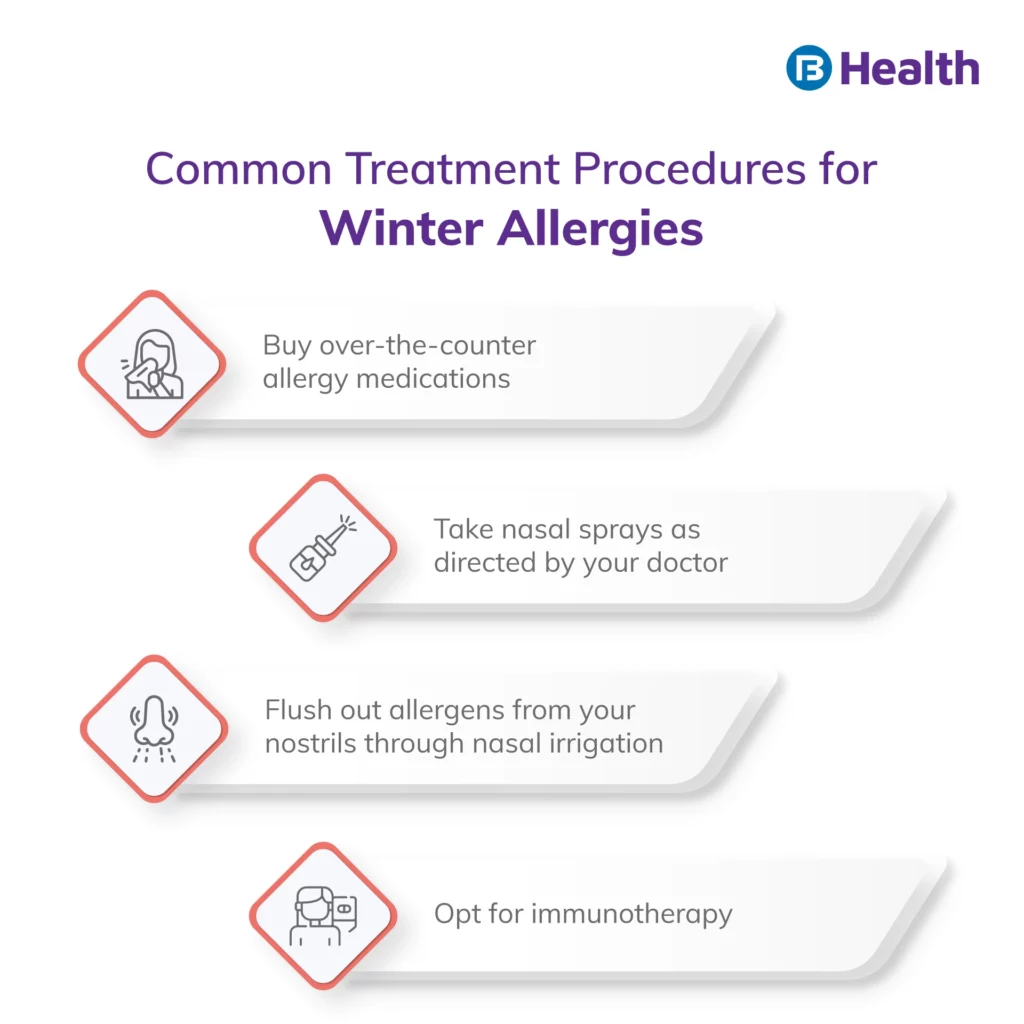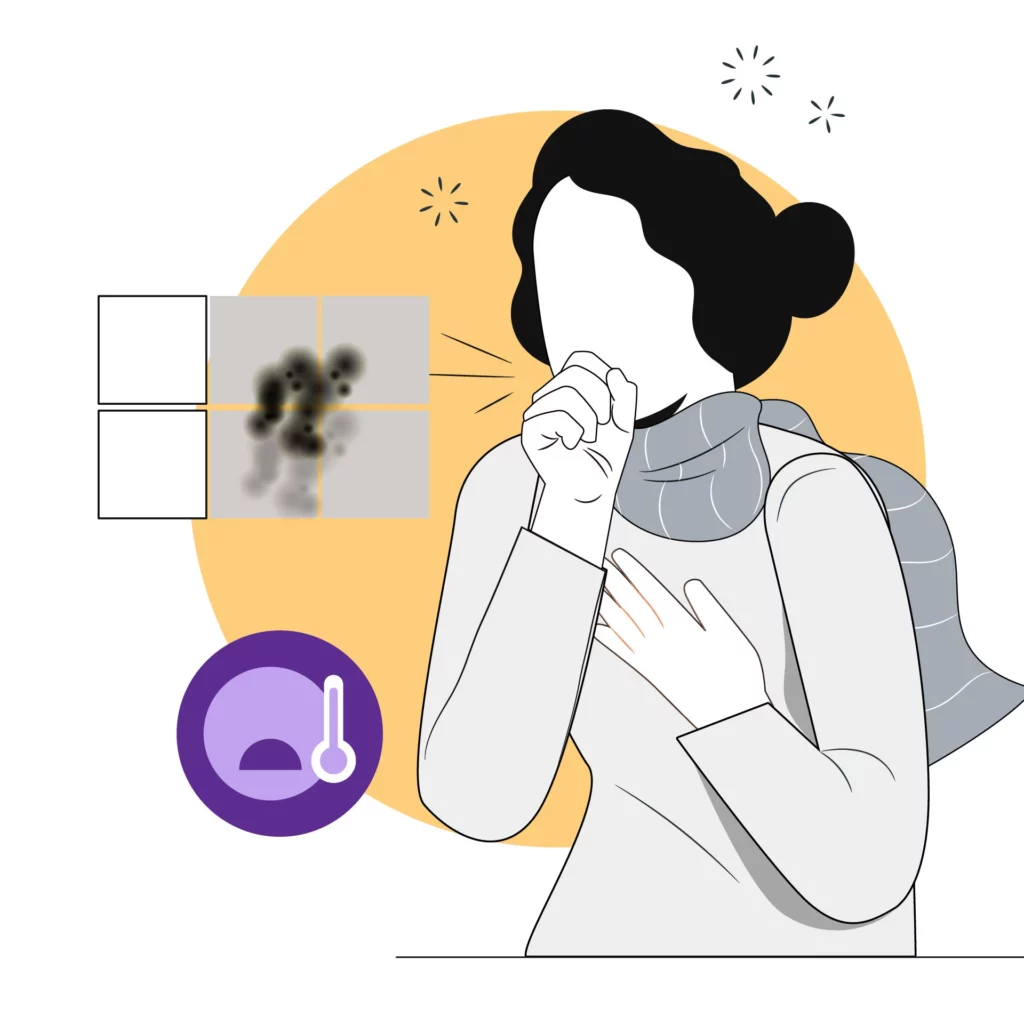General Health | 6 min read
Winter Allergies: 7 Top Things You Must Know About It
Medically reviewed by
Table of Content
Synopsis
As we are in the months of winter, it’s high time to be alert for winter allergies. Discover the winter allergy symptoms, how you can watch out for them, and the treatment options.
Key Takeaways
- Winter allergy symptoms are very close to that of allergic rhinitis
- Common causes of winter allergies include mould, dust mites and pet dander
- Early signs of winter allergies include continuous sneezing and a runny nose
Allergy is one of the most prevalent syndromes in human beings. As per an estimate, 10%-30% of people around the world suffer from allergic rhinitis or perennial allergy [1]. Apart from this, there are other types of allergies, such as winter allergies, occupational allergies, food allergies, and more. When it comes to winter allergy symptoms, they are extremely close to that of allergic rhinitis. However, there is a subtle difference between the two in terms of their prevalence. While getting allergic symptoms mostly during the months of winter and spring are referred to as winter allergies, people who suffer from cold and other allergy symptoms all around the year are considered to be suffering from allergic rhinitis.
As we are into the months of winter and spring, there is a high possibility of getting cold weather allergy symptoms if you are allergic to cold weather. Read on to learn in detail about seasonal allergies in winter and how you can prevent or treat winter allergies.
What are winter allergies?
The cold weather forces you to spend more time at home during winter; it is also a favorable condition for indoor allergens such as mould, dust mites and other airborne dust particles to flourish. Being allergic to them leads to winter allergy symptoms such as constant sneezing, runny nose, and more. Allergies during winter can continue throughout the season if you don’t take preventive measures such as dust allergies home remedies or initiate treatment.
Additional Read: Home remedies for skin rashesCommon Causes of Winter Allergies
The cold weather can host a variety of indoor allergens, which can trigger winter allergy symptoms. Here are the most common triggers for winter allergies:
Mould
This is a type of fungus that grows in cold weather and in damp, humid places. Common areas where you can get mould include bathrooms, sinks, and basements. When spores of mould start floating in the air, inhaling them can lead to winter allergies. Note that the presence of humidifiers, leaky faucets, or pipes makes cold weather allergy symptoms due to mould worse.
Dust mites
These microscopic creatures prefer a damp and warm environment to reproduce. That’s why they grow in large numbers in warm and unwashed bedclothes and mattresses during winter. Unfortunately, at that time, their presence or their droppings can enter your windpipe through the nose and mouth and cause winter allergy symptoms.
Pet-related allergens
As pets also spend a high amount of time at home during winter, people with pet allergies may get winter allergy symptoms throughout the season. Though animal fur is not an allergen for most people, it is not the same for the skin flakes of animals. Commonly referred to as pet dander, they are one of the major pet allergy triggers. Other key pet-related allergens include the proteins found in their saliva, faces,and urine.
Cockroach droppings
The number of cockroaches inside the home usually increases during winter due to the damp weather outside. As a result, their droppings also get mingled with air and lead to winter allergies.

Early Signs of Winter Allergies
- Blocked or runny nose
- Headaches
- Tickle in the throat
- Trouble breathing
- Continuous sneezing
- Red and itchy eyes
- Itchy ears
- Dry coughs with or without phlegm
- Mild fever
- Skin rashes
- A feeling of unusual sickness
Severe Winter Allergies Symptoms
If you suffer from chronic allergies, here are the usual symptoms you may experience during the cold season:
- Rapid breathing
- Tightness in chest
- Wheezing while breathing in and out
- Weariness
- Anxiety
Treatment Procedures for Winter Allergies
You can treat seasonal allergies in winter with either home remedies or medical treatments. Here are the choices you have:
Go for over-the-counter (OTC) medications for allergy
If you have frequent winter allergies, consider taking antihistamines such as fexofenadine or cetirizine regularly to get relief. OTC medications that have cetirizine and another drug named pseudoephedrine can be beneficial for associated symptoms like headaches.
Inhale nasal sprays
In case of winter allergies, doctors may recommend nasal sprays such as triamcinolone and fluticasone. Both these drugs can reduce runny nose, inflammation, and other winter allergy symptoms. You can also buy them as OTC medications.
Opt for nasal irrigation treatment
Send clean and distilled saline water through the blocked nostrils to flush out allergens. Use a net pot for the process.
Go for immunotherapy
Often doctors recommend allergy shots or immunotherapy if you have severe winter allergy symptoms. This is all about getting your body ready to fight the allergens by injecting them in small amounts into your body. It boosts the immunity of your body against them and reduces the intensity of winter allergies you usually get to a low level.
Additional Read: Monsoon Skin Problems
How to diagnose winter allergies?
If you experience winter allergy symptoms for more than seven days, you must see a doctor. Upon examining you, the doctor may refer you to an allergist who will note your health profile and current symptoms. The allergist then may perform a skin test to have a preliminary idea about whether you are allergic. For example, if your skin turns red and starts itching, it may indicate that you have seasonal allergies. In some cases, doctors may also prescribe a blood test for a more thorough diagnosis.
Prevention Tips for Winter Allergies
Remember, you cannot prevent an allergy. However, knowing you are allergic can effectively guard you against allergies. Here are the steps you can take:
- Discard wallpapers and shower curtains that have caught mold
- Install a dehumidifier so that your home’s humidity doesn’t go beyond 50%, and it can control mold and dust mites
- Repair any leaks in the bathroom or sinks
- Cover any openings or cracks with seals
- Clean your sinks and showers regularly with a bleach and detergent solution
- Clean up all traces of food in the kitchen and in the place where you have eaten
- Wash bed covers in warm water once a week
- Dust the dirt settled in your ornaments regularly
- Use a vacuum cleaner or a HEPA filter in your home to not allow dust to settle
- When it comes to purchasing ornaments, go for the ones made of plastic or glass. Note that fabric-made ornaments collect extra dust
- Buy allergy-proof covers for your bedding and mattresses
- Limit the movement of your pets inside the home. Make sure they don’t sleep inside the kitchen, bathroom or bedroom
Conclusion
With all this information on allergies and tips on how to watch out for seasonal allergies in winter, you can easily prevent or manage winter allergy symptoms. Thus, you can lead a happy and healthy life, defeating all odds. Remember, you can get a doctor consultation on Bajaj Finserv Health if you have any queries or a health emergency. Consult with a general physician and get your concerns resolved within minutes!
FAQs
What are the most common triggers of winter allergies?
- Mould
- Dust mites
- Pet dander
- Other pet-related allergens (saliva, urine and faces)
- Droppings by cockroaches
How long do winter allergies last?
Usually, it may disturb you for a week, and then the symptoms gradually disappear. However, in the case of severe allergies, winter allergy symptoms may last for weeks.
Do air purifiers reduce triggers of winter allergies?
As per multiple studies, air filtration helps people suffering from allergies by reducing the number of airborne allergens [2].
What is the major difference between allergic rhinitis and winter allergies?
While pollens have a major role to play in causing allergic rhinitis, they are not linked to allergies.
References
- https://www.aaaai.org/About/News/For-Media/Allergy-Statistics
- https://www.ncbi.nlm.nih.gov/pmc/articles/PMC3165134/
Disclaimer
Please note that this article is solely meant for informational purposes and Bajaj Finserv Health Limited (“BFHL”) does not shoulder any responsibility of the views/advice/information expressed/given by the writer/reviewer/originator. This article should not be considered as a substitute for any medical advice, diagnosis or treatment. Always consult with your trusted physician/qualified healthcare professional to evaluate your medical condition. The above article has been reviewed by a qualified doctor and BFHL is not responsible for any damages for any information or services provided by any third party.





